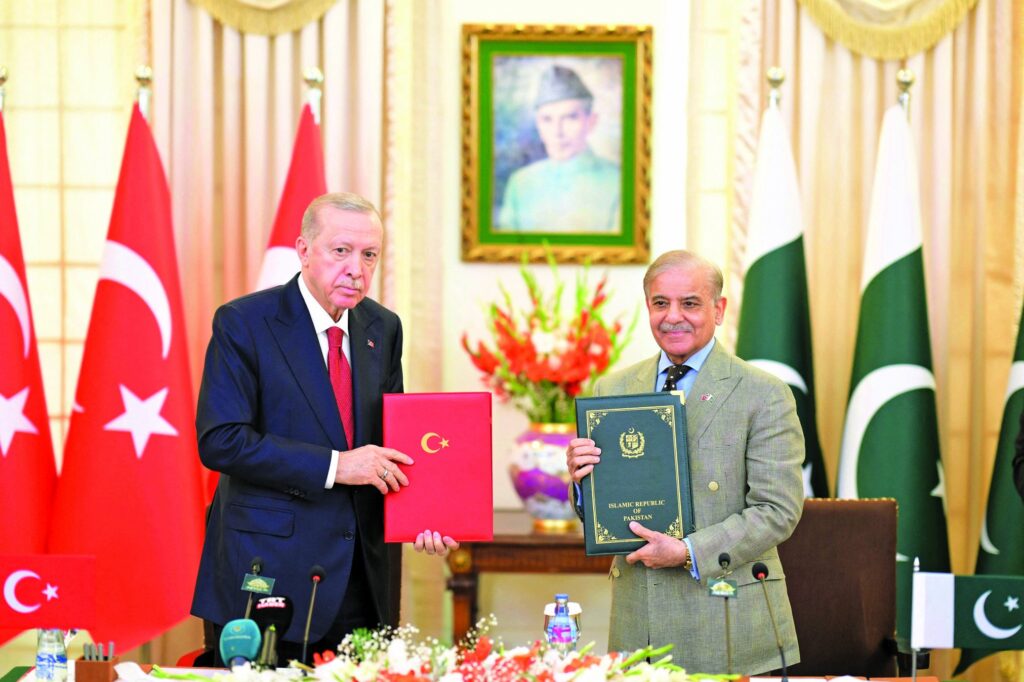Islamabad, February 21, 2025 — In a significant move reshaping regional alliances, Pakistan and Turkey have solidified their defense partnership through a series of agreements aimed at enhancing military cooperation and reducing reliance on Western defense systems. This development presents a strategic challenge to U.S. influence in the region and signifies a shift in the balance of power.
A New Era of Collaboration

During the 7th session of the Pakistan-Turkey High-Level Strategic Cooperation Council held in Islamabad on February 13, 2025, Turkish President Recep Tayyip Erdoğan and Pakistani Prime Minister Shehbaz Sharif signed multiple agreements covering defense, energy, trade, and technology. These agreements signify a deepening of ties between the two nations, with a particular focus on defense collaboration, military production, and security cooperation.
Pakistan and Turkey have historically enjoyed strong diplomatic and military relations, and this recent development marks a significant milestone in their long-standing partnership. The agreements focus on joint military production, technology transfer, and cooperative security initiatives that will enable both nations to strengthen their self-reliance in defense manufacturing.
Joint Production of Advanced Fighter Jets
A cornerstone of this enhanced partnership is the establishment of a joint facility for the production of the KAAN fighter jet, Turkey’s fifth-generation combat aircraft. The agreement aims to bolster both countries’ air combat capabilities and reduce dependence on external defense suppliers. The KAAN fighter jet is expected to play a crucial role in modernizing Pakistan’s air force and strengthening Turkey’s position as a rising defense exporter.
The joint production facility is expected to serve as a hub for technological innovation and self-reliance in defense manufacturing. Experts suggest that the agreement will not only enhance Pakistan’s air combat capabilities but also strengthen Turkey’s footprint in the global defense market, positioning it as a reliable supplier for advanced weaponry and fighter jets.
Enhancing Electronic Warfare Capabilities
In addition to aircraft production, Pakistan and Turkey have signed a Memorandum of Understanding to develop an Airborne Stand-Off Jammer (A-SOJ) system. This advanced electronic warfare platform is designed to disrupt enemy communications and radar systems, providing a strategic advantage in modern warfare scenarios.
The system will be integrated onto Pakistan’s military aircraft and will significantly improve the country’s ability to conduct electronic warfare. Turkey has already developed expertise in electronic warfare through its HAVA SOJ program, and this collaboration will allow Pakistan to benefit from Turkey’s technological advancements while contributing its own expertise in defense applications.
Historical Context and Previous Challenges
The defense relationship between Pakistan and Turkey has faced obstacles in the past, particularly concerning U.S. sanctions and export restrictions. One notable example is the stalled $1.5 billion deal for Turkey to supply 30 T129 ATAK helicopters to Pakistan. The deal was delayed due to the U.S. refusal to grant export licenses for the engines, prompting Pakistan to seek alternative suppliers, including China. This delay highlighted the vulnerabilities of relying on Western defense supply chains and reinforced the need for greater self-sufficiency.
With the recent agreements, Pakistan and Turkey are taking steps to bypass Western restrictions and create an independent defense ecosystem. The production of KAAN fighter jets and electronic warfare systems will allow both countries to decrease their dependence on the U.S. and European defense industries, further solidifying their ability to operate without external interference.
Implications for U.S. Influence
The burgeoning defense partnership between Pakistan and Turkey signals a shift away from traditional reliance on U.S. military hardware and support. This realignment could diminish U.S. strategic influence in the region, as both nations seek to assert greater autonomy over their defense capabilities.
Over the years, Washington has used military aid and defense contracts to maintain influence over key allies. However, as Turkey and Pakistan strengthen their cooperation, the U.S. faces growing challenges in controlling the strategic direction of South Asia and the Middle East. Experts believe that this partnership may encourage other regional players to explore similar alliances, reducing Western dominance in military supply chains.
Economic and Strategic Objectives
Beyond defense, the agreements aim to elevate bilateral trade between Pakistan and Turkey to $5 billion annually, a significant increase from the current trade volume. This economic ambition underscores the multifaceted nature of the partnership, encompassing energy cooperation, technological exchange, and cultural ties. The comprehensive nature of these agreements indicates a strategic intent to foster long-term collaboration across various sectors, thereby strengthening the geopolitical standing of both nations.
Turkey has become an increasingly important trade partner for Pakistan, with key areas of cooperation including infrastructure development, renewable energy, and technology transfer. The new agreements are expected to enhance economic growth in both countries and create opportunities for job creation, investment, and technological advancements.
Regional Repercussions
The enhanced Pakistan-Turkey alliance may prompt reactions from neighboring countries and global powers. India, in particular, might view this development with concern, potentially leading to a recalibration of its defense strategies and alliances. India has traditionally maintained strong defense ties with Russia and Western nations, but the strengthening of Pakistan-Turkey ties could push New Delhi to enhance its own partnerships with other global players.
Similarly, the United States may need to reassess its approach to defense partnerships and influence in the region, considering the shifting dynamics and the emergence of new alliances that challenge its traditional dominance. Washington may respond by increasing military aid to India or reinforcing its strategic ties with other allies in the Asia-Pacific region to counterbalance the growing influence of Turkey and Pakistan.
The agreements could also have an impact on NATO, as Turkey remains a key member of the alliance while pursuing independent defense deals outside the Western framework. This move could strain Turkey’s relations with the U.S. and European allies, who may view its growing ties with Pakistan as a challenge to their geopolitical interests.
Conclusion
The deepening defense ties between Pakistan and Turkey represent a strategic pivot with far-reaching implications for regional security and global power balances. As both nations pursue greater self-reliance and collaborative growth, their partnership challenges existing paradigms and introduces new dynamics into the geopolitical landscape. Observers will closely monitor how this alliance influences regional stability, defense strategies, and the broader international order in the coming years.
As the geopolitical landscape continues to shift, the Pakistan-Turkey defense partnership stands as a testament to the growing trend of non-Western alliances that seek to challenge the status quo. This partnership marks a bold step toward greater military autonomy, setting a precedent for other nations looking to reduce their dependence on traditional power centers.
Saudi Arabia Advocates for Ukraine’s Inclusion in U.S.-Russia Peace Talks



